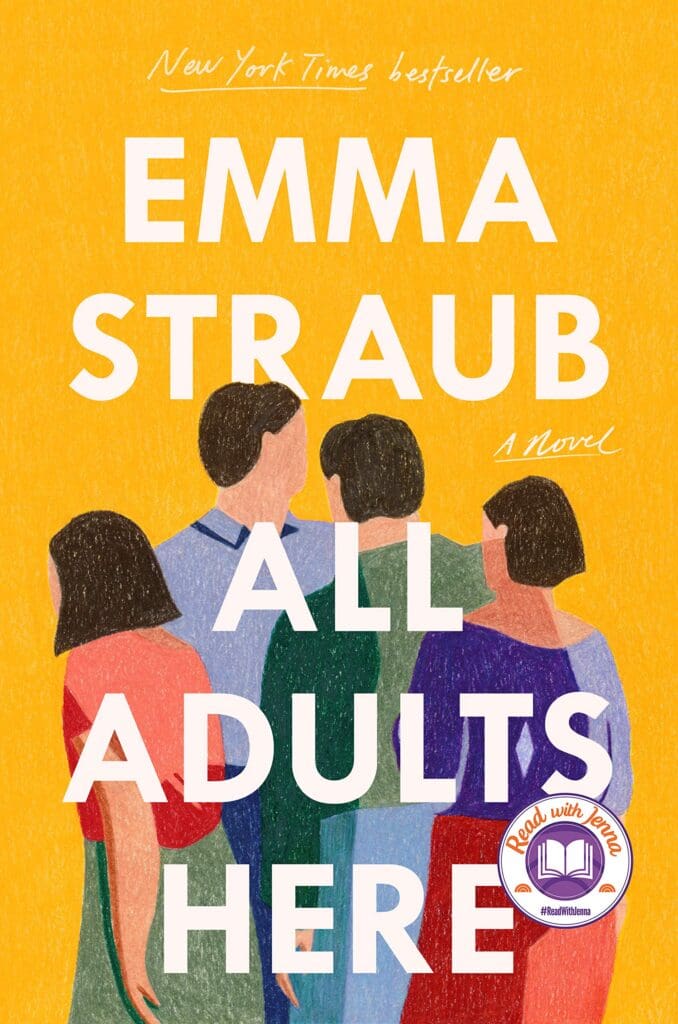Emma Straub’s delightful third novel, All Adults Here (368 pages; Riverhead Books), takes place in Clapham, a fictional Hudson Valley town. It’s a small, white, and affluent community that is both a getaway for New Yorkers and a reservoir for elite Brooklynite culture. A roundabout sits in the center of town (a commercial hotspot where an obtrusive, geometric, and vacant building houses a threat: the possibility of a chain store opening in Clapham). Residents circle through downtown like clockwork until one day a school bus kills longtime resident Barbara Baker right before matriarch Astrid Strick’s eyes, sending atriggering repressed memory to the surface of her psyche.
Astrid is the pragmatic, well-intentioned but unsentimental head of the family at the center of Straub’s novel. She comprises what’s left of the Strick family’s parental unit. Her husband died when most of their children—Nicky, Porter, and Elliot—were already grown. The novel’s intergenerational story follows Astrid, her children, and Nicky’s daughter, Cecelia, a rising eighth-grader whom Nicky sends to live with Astrid after the girl’s conflict with a friend escalates into legal threats.
All Adults Here proceeds to entertainingly weave its characters’ numerous plotlines, including Astrid making public her queer relationship with a longtime hairdresser and confidant; Cecelia’s attempts to make the right friends; Porter’s pregnancy as a decidedly single mother; and Elliot’s struggle to feel worthy as a businessman and son to Astrid. Straub handles well the episodic, soap-opera dynamics of the story, keeping the threads clear even as the perspective bounces among several characters. The prose is sharp and playful, and much of the novel’s humor comes from prodding at the politics of respectability and status of the white bourgeois, and how the characters are often oblivious to these things.
The novel’s keen analysis of family dynamics feels candid and representative of sociological truths, such as the shifting alliances in families, the exacting consequences of birth order, and the way we often magnify our family’s faults:
Porter had sometimes had dreams that her mother was dead and that the three siblings would have to move in with Mr. Chang, even though they were adults and could theoretically take care of themselves, and that Mr. Chang and his wife would teach them things that their parents never did, like how to play the piano and make pasta from scratch, and when Porter woke up, she would feel guilty about enjoying her new parallel life.
Straub writes about numerous social matters such as gentrification and queerness, some more successfully than others. For example, Straub’s handling of a trans character’s pronouns and continued use of her dead name in the narration proves to be glaring and problematic. It seems that in an attempt to convey code-switching or the complicatedness of gender identity at a young age, Straub actually creates a reductive and potentially harmful depiction of trans identity.
But despite that, All Adults Here is a testament to Straub’s ability to infuse the comic with wisdom. Late in the novel, Porter remembers ending her relationship with her high school boyfriend after getting an abortion. It was her “gift” to him, so that he could forget what happened. Straub writes, “that was how good her body was—[Porter] could hold it all, even the memory of the tiny cells she would get rid of.” This novel at times feels like literary epigenetics, as Straub illustrates how our experiences and familial relationships leave marks long after their sources leave us.

